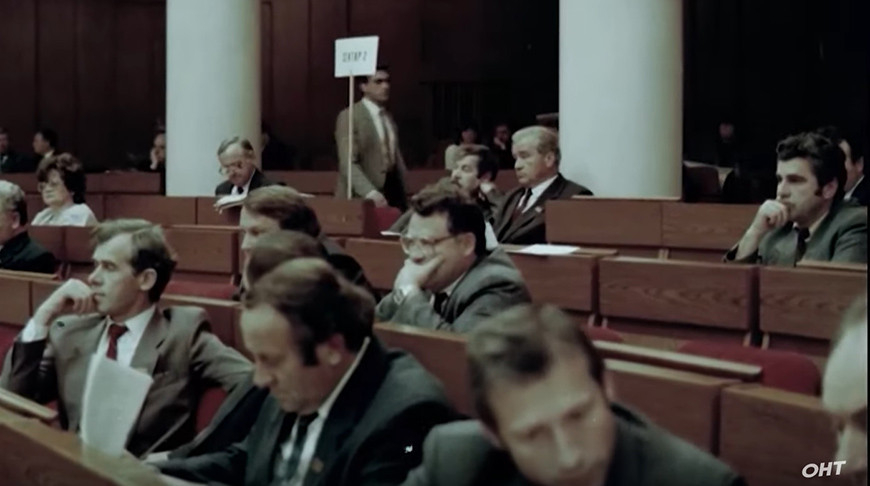
Screenshot of an ONT video
MINSK, 12 July (BelTA) – A historical turning point for Belarus took place in the autumn of 1996 when constitutional amendments designed to strengthen presidential power were adopted in a national referendum, former prime minister of Belarus Mikhail Myasnikovich (2010-2014) recalled in the ONT documentary “One for All” dedicated to the 30th anniversary of the institution of the presidency in Belarus, BelTA has learned.
The authors of the documentary noted that the ability to take responsibility is something that makes Aleksandr Lukashenko stand out from most of politicians. The struggle for power in Belarus did not end with the election of the head of state. Parliament tried to pass laws that it could not bankroll while sabotaging the initiatives proposed by the president.
“They had to get their act together and start working efficiently. This did not happen. These splits and tussles went on for several more years. It was not a good look for the authorities’ opponents,” said Grigory Vasilevich, Head of the Constitutional Law Department of the Law Faculty of Belarusian State University, a member of the Constitutional Commission (1991-1994).
Was this done, as they say, by inertia? Or were individual members of the Supreme Council determined to cling on to power and were afraid to ease their grip? The question is rhetorical, as noted in the documentary.
For example, in March 1996, the budget of Belarus was not adopted in time. This is how the then finance minister commented on this situation: “Austerity should be one of the underlying principles of the budget. The budget presented by the president is balanced, has been evaluated by all experts that could be found in the Republic of Belarus, and it will allow the republic to carry on and implement all programs planned for 1996.”
“So, in your opinion, is the budget feasible?” correspondents asked.
“It is,” the minister replied.
Former Prime Minister Mikhail Myasnikovich also recalled that period. In the early 1990s, he worked in the government as First Deputy Chairman of the Council of Ministers.
“The Supreme Council wanted to retain those functions that the new Constitution would delegate to the head of state. Therefore, the national referendum held in the autumn of 1996 marked this historical turning point in state building for the country,” said Mikhail Myasnikovich.

Aleksandr Lukashenko emphasized: “The people did not give me power to transfer it to some political adventurers. I know what kind of people they are. It feels good to be at the steering wheel, but the responsibility for where this ship is heading will be totally yours.”
The constitutional amendments were drafted within a month: the country would turn from a parliamentary republic into a presidential one. The Supreme Council, in turn, proposed to completely abolish the post of the head of state - just two years after its introduction.
“The parliament started working on impeaching the president. People saw it and started showing their support [for the president]. So we managed to turn the situation around, but it took time. I saw all this at the Constitutional Court, and I was outraged by the behavior of both the authorities and the judges. The president proposed a referendum - no one had the right to rescind this decision,” noted Sergei Ling, who served as Deputy Prime Minister in 1991-1994 and head of government in 1996-2000
“Everything fell into place and everyone began to do their job. And this is the most important thing,” the ex-chairman of the House of Representatives Vladimir Andreichenko added.













